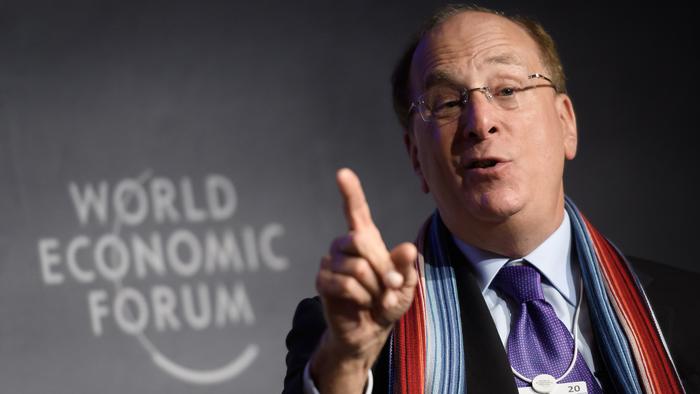Blackrock Responds To Soros' Scathing Op-Ed, Ray Dalio Also Chimes In
Yesterday we reported that in George Soros' escalating crusade against China in general, and Xi Jinping in particular, the 91-year-old billionaire penned a scathing WSJ op-ed in which Soros shifted his sights away from China and toward the the one fund that is actively legitimizing Xi's regime by allocating more resources to the country. Blasting the world's largest asset manager, Soros described BlackRock’s investment in China as a “tragic mistake” that would “damage the national security interests of the U.S. and other democracies.”
The op-ed, titled “BlackRock’s China Blunder,” said the firm’s decision to pour billions into the country was a “bad investment” likely to lose money for its clients. By publishing the article, the prominent liberal and Democrat donor exposed Wall Street's ESG hypocrisy - where it is perfectly acceptable to slam the US but where most keep their mouths shut when it comes to Beijing, well aware any criticism could lead to an immediate loss of access to China's 1.4 billion consumers. As we said yesterday, "Soros is, of course, correct in his disdain and criticism of China although due to his ideological presence in the US, we expect that his laments will be soundly ignored and mocked, even if his criticism opens a rare schism within the otherwise unbreakable facade among Wall Street's most prominent firms such as BlackRock, Blackstone, Bridgewater and Goldman, where criticism of America is perfectly acceptable and encouraged but any badmouthing of Xi's regime is grounds for an immediate career short-circuit."
The op-ed also came shortly after BlackRock - whose AUM rose to a stunning $9.49 trillion in Q2, up from $7.32 trillion a year earlier - launched a set of mutual funds and other investment products for Chinese consumers. The initiative saw BlackRock become the first foreign-owned company to operate a wholly owned business in China’s mutual fund industry. Blackrock told CNBC that its China mutual fund subsidiary set up its first fund in the country after raising 6.68 billion Chinese yuan ($1.03 billion) from more than 111,000 investors, suggesting the fund was targeting retail investors.
Of course, Blackrock - whose boss Larry Fink has emerged as an outspoken social justice warrior and paragon of virtue on topics such as stock buybacks, minority rights and climate change but refuses to touch China's oppressive regime with a 10 trillion foot long pole - could not afford to leave the op-ed without commenting, and this morning a BlackRock spokesperson responded to Soros’ comments, telling CNBC that “the United States and China have a large and complex economic relationship,” adding that "total trade in goods and services between the two countries exceeded $600 billion in 2020. Through our investment activity, US-based asset managers and other financial institutions contribute to the economic interconnectedness of the world’s two largest economies."
The above is a great example of "responding" without actually responding, and certainly without addressing Soros' key point, namely that "the U.S. and China are engaged in a life and death conflict between two systems of governance" and that by profiting from China, Blackrock is directly enabling the country to eventually overtake the US.
Blackrock continued with its "non-response" response: “The overwhelming majority of the assets BlackRock manages are for retirement. BlackRock’s clients around the world — including many US clients — seek a broad range of investments, including in China, to achieve their retirement and other financial objectives,” the spokesperson said, once again without addressing any of the points raised by Soros.
Where BlackRock did somewhat touch on Soros' criticism iw when it said that it believes it can help China to address its growing retirement crisis by providing retirement system expertise, products and services.
“We believe that globally integrated financial markets provide people, companies, and governments in all countries with better and more efficient access to capital that supports economic growth around the world.”
This naive justification that BlackRock is engaging China out of pure altruism, was clearly debunked by Soros himself, who said that “earlier efforts could have been morally justified by claims that they were building bridges to bring the countries closer, but the situation now is totally different."
* * *
It wasn't just the world's largest asset manager that was scrambling to defend it ESG-reputation and "virtue" after the scathing Soros op-ed: the world's largest hedge fund also took notice.
Speaking at a Bloomberg Radar event, Ray Dalio - whose Bridgewater Associates is the world’s biggest hedge fund with the exception of central banks of course - talked about his long history of visiting and working in Asia, as well as his first visit to China in 1984. Dalio’s personal family office expanded to Singapore in 2020.
“It’s a part of the world that one can’t neglect and not only because of the opportunities it provides but you lose the excitement if you’re not there,” Dalio said when asked about his family office’s plans. “And so our objective is to be there both economically and investment-wise.”
Neither Dalio nor Fink came within a mile of addressing Soros' criticism.
When asked about efforts to bridge the wealth gap, Dalio reiterated his support for the reformation of capitalism and said that when he first visited China there was no philanthropy in the country. “Now as part of the re-distribution or sharing of the wealth there’s more of that going on,” he said. It wasn't immediately clear if he was addressing the ongoing wealth redistribution in China or in the US. Tyler Durden Wed, 09/08/2021 - 12:05
http://dlvr.it/S79zVn

No comments:
Post a Comment